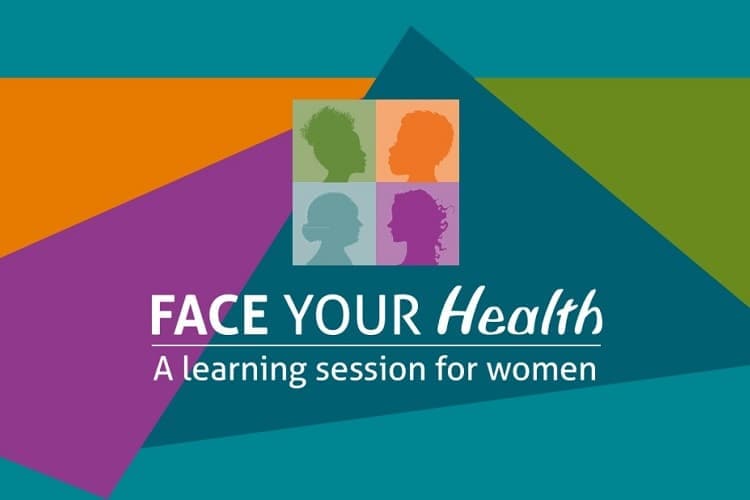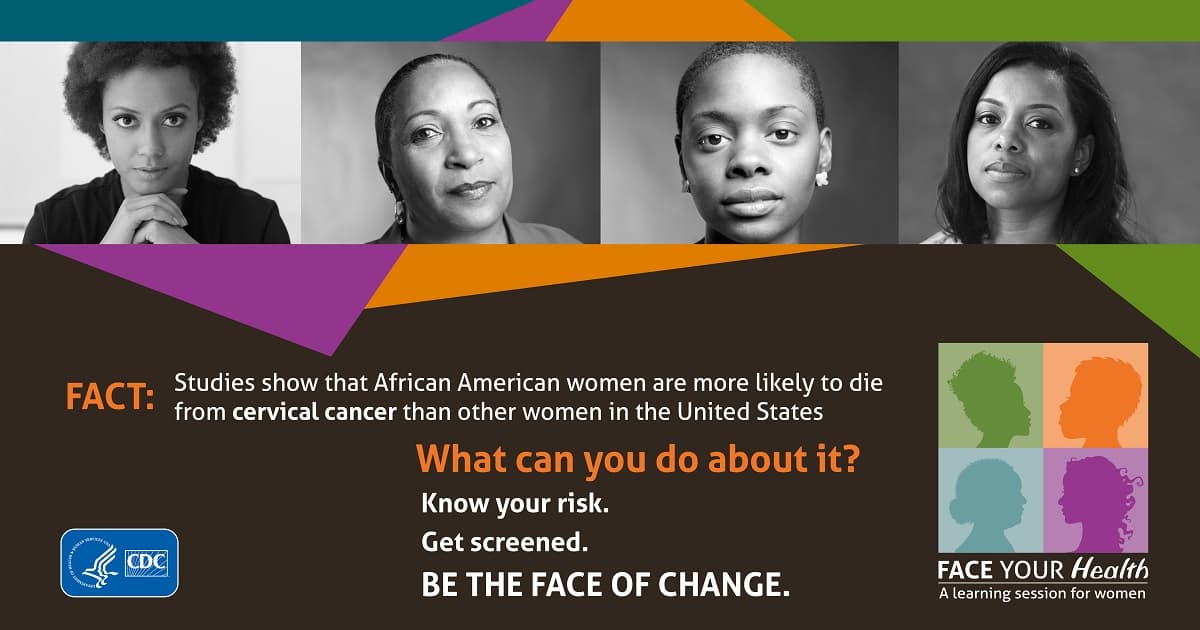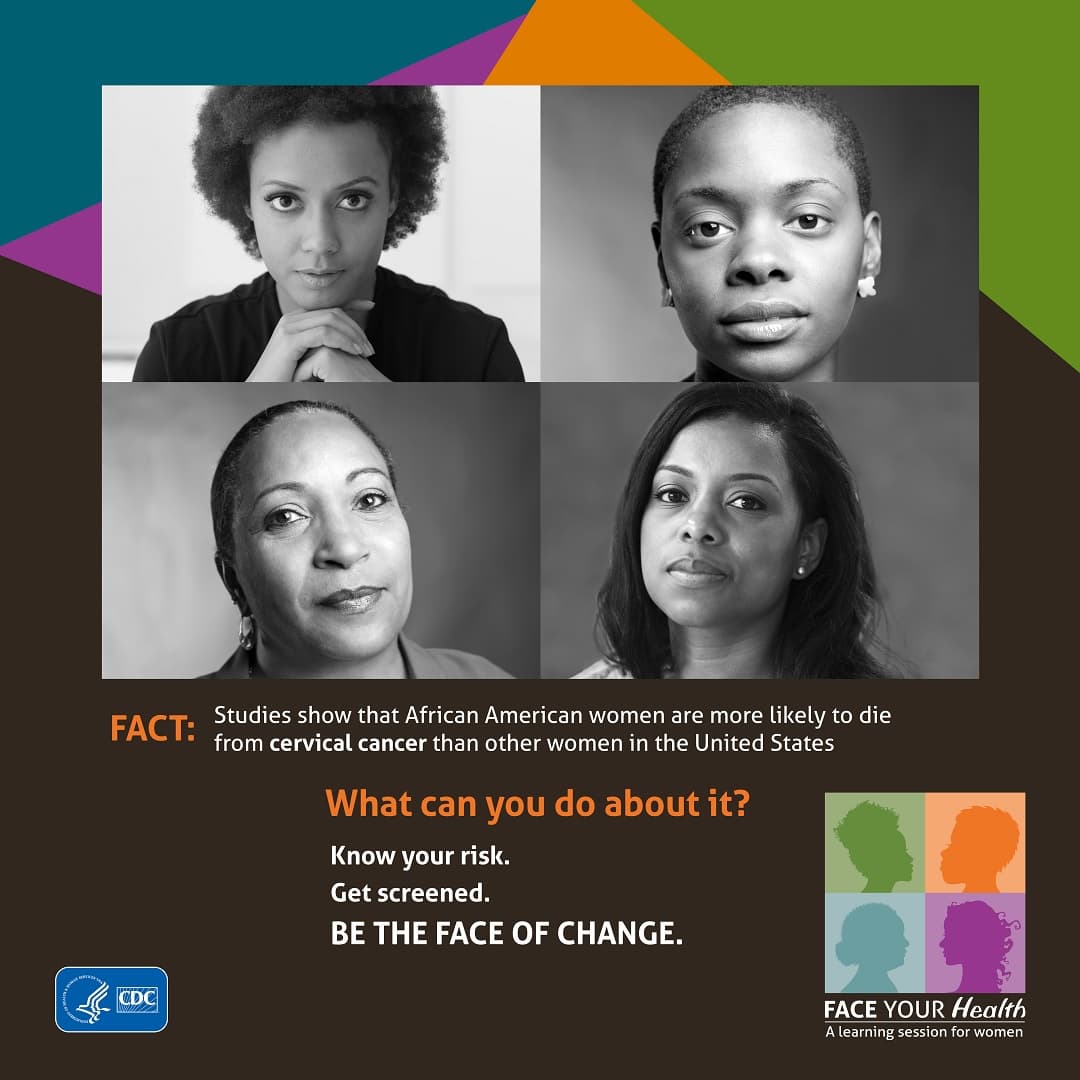Face Your Health
A Learning Session for Women

If African American women in your community are not taking advantage of local cervical cancer screening resources, Face Your Health is a proven program that can help!
What Is Face Your Health?
Face Your Health is an educational outreach program to encourage African American women to get screened for cervical cancer.
Who Is It For?
Face Your Health was designed for African American women aged 21 to 65 who have never been screened for cervical cancer, or who don’t get screened regularly.
Why Is It Important?
It’s especially important for African American women to make getting screened for cervical cancer a priority.
- Many women do not understand why they need screening, when they should be screened, and how they can be screened.
- They may also face situations that make it harder to get screened, such as lack of insurance coverage or access to a regular health care provider or clinic.
The bottom line? This doesn’t have to happen. Regular screening can help prevent cervical cancer or help find it early, when it’s easier to treat. Face Your Health encourages women to know their risk, get screened, and be the face of change.
What Makes It Unique?
- Community-oriented: Face Your Health was developed by researchers at CDC with input from experienced African American community health workers (CHWs) and program administrators. CHWs and other lay health educators deliver learning sessions in a variety of settings.
- Audience-friendly: The learning session and materials are easy to follow and understand. Visual aids engage women with different levels of reading skills and health knowledge.
- Flexible: CHWs can adapt the learning session for the number of participants, time available, and setting. The session can stand alone or be combined with another health topic.
- Effective: The program is rooted in scientific evidence, based on proven behavior change theories, and adapted from a program shown to increase cervical cancer screening in Hispanic women in a scientific study. Face Your Health’s main messages and handouts were tested with African American women.
- Interactive: Games and other activities help review and reinforce information, promote discussion, and address concerns.
- Easy to use: Face Your Health can be integrated easily into outreach work CHWs are already doing. A lesson plan guides the sessions. Materials can be customized and printed on a desktop printer.
What Are the Benefits of Face Your Health?
For Women
- Participants learn how to prevent cervical cancer, why regular screening is important, and where they can get screened.
- They are linked with CHWs who can help guide them through the learning and decision-making process and connect them with screening and support services.
- The program also encourages women to feel—
- Important to themselves, their families, and their community.
- Empowered to ask questions, seek knowledge, and use what they learn to stay healthy.
- Supported to know there are people and resources in their community ready to help.
- Resourceful to find ways to overcome challenges and take care of themselves.
For the Community
Face Your Health can help improve the health of African American women in your community. It can put you on track to—
- Improve knowledge about cervical cancer.
- Increase the number of women who get screened.
- Identify ways to reduce or remove barriers to screening.
For Organizations
The program can help organizations—
- Build the capacity of existing CHW programs.
- Leverage funding to support CHW programs.
- Increase reimbursement for covered services.
- Promote their visibility in the community.
- Improve communication between the community and health care providers.
- Strengthen existing community partnerships or build new ones.
- What Community Health Workers Need to Know [PDF-934KB]
- Quick Reference Guide [PDF-213KB]
- Flip Chart [PDF-2MB]
- Pre Learning Session Checklist [PDF-184KB]
- Post Learning Session Checklist [PDF-185KB]
- Learning Session Cheat Sheet [PDF-181KB]
- Learning Session Record [PDF-99KB]
- Learning Session Evaluation Form [PDF-154KB]
- Fact Sheet [PDF-151 KB]
- Appointment Sheet [PDF-149 KB]
- Contact Sheet [PDF-161 KB]
- Promise Sheet [PDF-140 KB]
- Resource Sheet [PDF-162 KB]
- Face the Facts Game [PDF-207KB]
- Face Yourself Game [PDF-215KB]
- Icebreaker: The Web Game [PDF-161KB]

